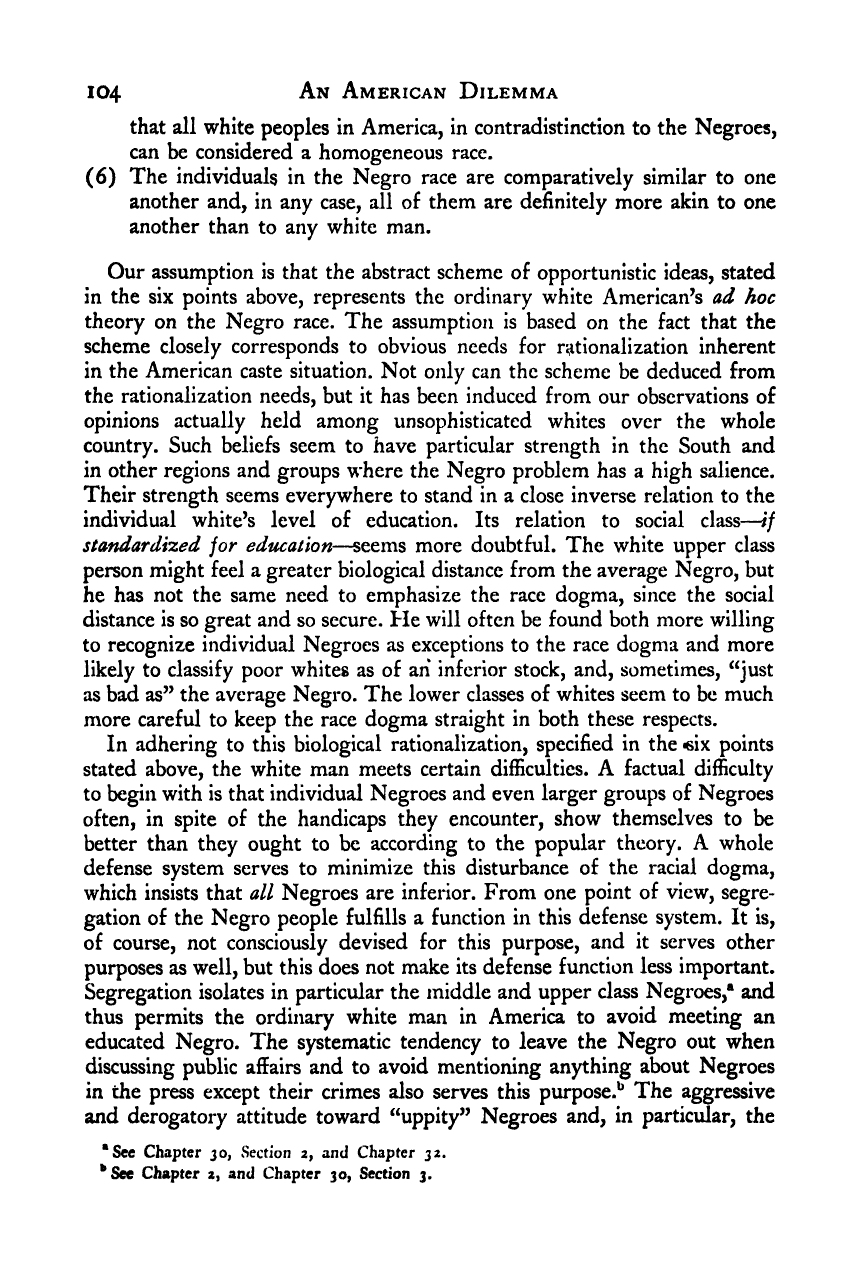Note: Gunnar Myrdal died in 1987, less than 70 years ago. Therefore, this work is protected by copyright, restricting your legal rights to reproduce it. However, you are welcome to view it on screen, as you do now. Read more about copyright.
Full resolution (TIFF) - On this page / på denna sida - II. Race - 4. Racial Beliefs - 7. Beliefs with a Purpose

<< prev. page << föreg. sida << >> nästa sida >> next page >>
Below is the raw OCR text
from the above scanned image.
Do you see an error? Proofread the page now!
Här nedan syns maskintolkade texten från faksimilbilden ovan.
Ser du något fel? Korrekturläs sidan nu!
This page has never been proofread. / Denna sida har aldrig korrekturlästs.
104 An American Dilemma
that all white peoples in America, in contradistinction to the Negroes,
can be considered a homogeneous race.
(6) The individuals in the Negro race are comparatively similar to one
another and, in any case, all of them are definitely more akin to one
another than to any white man.
Our assumption is that the abstract scheme of opportunistic ideas, stated
in the six points above, represents the ordinary white Americanos ad hoc
theory on the Negro race. The assumption is based on the fact that the
scheme closely corresponds to obvious needs for rationalization inherent
in the American caste situation. Not only can the scheme be deduced from
the rationalization needs, but it has been induced from our observations of
opinions actually held among unsophisticated whites over the whole
country. Such beliefs seem to have particular strength in the South and
in other regions and groups where the Negro problem has a high salience.
Their strength seems everywhere to stand in a close inverse relation to the
individual white’s level of education. Its relation to social class—ij
standardised for education—seems more doubtful. The white upper class
person might feel a greater biological distance from the average Negro, but
he has not the same need to emphasize the race dogma, since the social
distance is so great and so secure. He will often be found both more willing
to recognize individual Negroes as exceptions to the race dogma and more
likely to classify poor whites as of an inferior stock, and, sometimes, “just
as bad as” the average Negro. The lower classes of whites seem to be much
more careful to keep the race dogma straight in both these respects.
In adhering to this biological rationalization, specified in the •six points
stated above, the white man meets certain difficulties. A factual difficulty
to begin with is that individual Negroes and even larger groups of Negroes
often, in spite of the handicaps they encounter, show themselves to be
better than they ought to be according to the popular theory. A whole
defense system serves to minimize this disturbance of the racial dogma,
which insists that all Negroes are inferior. From one point of view, segre-
gation of the Negro people fulfills a function in this defense system. It is,
of course, not consciously devised for this purpose, and it serves other
purposes as well, but this does not make its defense function less important.
Segregation isolates in particular the middle and upper class Negroes,® and
thus permits the ordinary white man in America to avoid meeting an
educated Negro. The systematic tendency to leave the Negro out when
discussing public affairs and to avoid mentioning anything about Negroes
in the press except their crimes also serves this purpose.*^ The aggressive
and derogatory attitude toward “uppity” Negroes and, in particular, the
“See Chapter 30, vSection 2, and Chapter 32.
®Scc Chapter 2, and Chapter 30, Section 3.
<< prev. page << föreg. sida << >> nästa sida >> next page >>